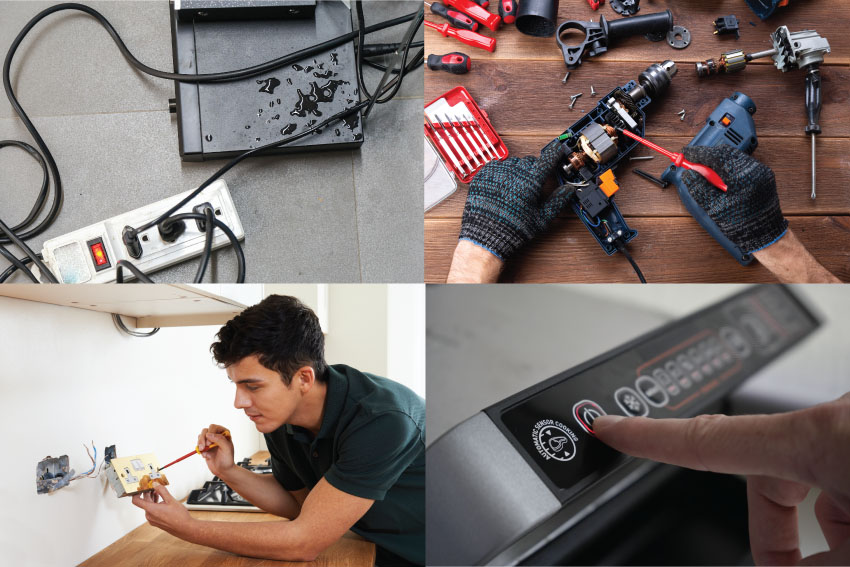
Never compromise on safety. Whether you’re getting the pros in for a top-notch job, or doing a job yourself to save money and get things done sooner, electrical safety during and after maintenance and installation could quite literally be the difference between life and death. So, make sure to read these five tips for electrical safety before you get started:
1. Ensure the Power is Off
First things first, whether you’re looking to wire, rewire, or repair, make sure the power is off. This means locating the board in your property and ensuring the beaker switches are flicked off.
In most modern properties, there will be just one board and these switches will be clearly labelled. However, this may not be as straightforward if you have an older property or live in a shared unit such as a block of flats.
Therefore, after doing this, it is always best to check whether the cables are live. You can do this with a voltage meter reader or tester pen. In future, these tools are also super helpful for testing continuity and AC/DC voltage, so you can tell if there are connection issues or shorts.
If they are still live, then this suggests there is another box or switch somewhere.
2. Inspect Your Equipment
If you’re an occasional DIYer, it’s likely you don’t use tools and electrical equipment on a regular basis. Therefore, it is important to inspect what you have to ensure you have the correct tool for the job, and that it is in safe working condition. After all, sitting in a garage or shed for a long period of time could cause them to perish.
Before you plug any power tools in, check the lead and plug are in good condition. If there are any cable frays or broken fuses, the tool is unlikely to work or could become a hazard. So, get it fixed immediately.
Battery powered tools are preferred wherever possible as there is less risk of electrical shock.
3. Ensure You Have The Right Materials
Although created in line with British Standards (BS) and European Standards (EN), different cables should be used for different purposes. For example, flexible industrial cables 450/750V for equipment and appliances. Multi-element metallic cables for analogue and digital communication, low smoke zero halogen (LSZH) 450/750V for power and lighting, and so on. And, that’s just cables!
So, make sure to do your research on the materials you’ll need before you get started. Using the wrong materials could lead to faults and fires.
While signs, tapes, and tags are more common in commercial premises, make sure to explore our range of electrical labels for your home DIY too. We think you’ll find our wire markers and cable identification labels particularly handy.
4. Stay Away From Water
Water and electricity do not mix well. Water is highly conductive, and electricity will always follow the route of least resistance, therefore a meeting can cause electricity to bypass its intended path in a circuit. This can lead to malfunction, fire, explosion, and bodily harm if you are in the vicinity.
So, if you’ll be doing electrical DIY, ensure you have dry and not sweaty hands, there are no drinks such as cups of tea nearby, and you are suitably sheltered from the weather and any leaks.
5. Get it Checked by a Professional
All electrical work done in the UK must comply with Part P of the Building Regulations. Therefore, major works should be carried out by a trained professional. If you attempt to do work yourself, it is advised to get this checked and signed off by a qualified electrician to ensure it is safe.
There are some exceptions around minor works though. You do not need an electrician to change existing sockets, switches, or lighting fittings, or to install single fused spurs to an existing circuit – for example, a new cable and socket run as a branch from an existing socket on the ring main.
Stay Safe With Label Source’s Help
We’ve been a dedicated supplier of quality, cost-effective identification products since 1994. So, if you’re looking for electrical safety labels, tags, signs, tapes, or signage for any other reason, we have the knowledge and experience you can trust. Check out our range today!
For further, more generalised advice, please take a look at our post: Electrical Safety: 5 Top Tips